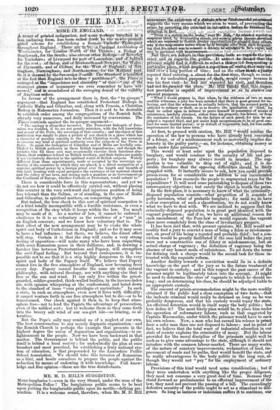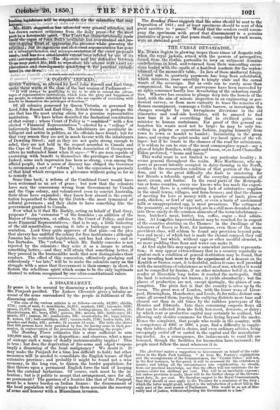MR. M. D. HILL'S SUGGESTION.
Moire burglaries !—even in the very, Strand, under the nose of the Metropolitan Police ! The burglarious publics seems to be bent upon putting the burglariable public upon its mettle—defying pre-
vention. It is a welcome sound, therefore, when Mr. D. Trill
es he very nternsGivrthficriwe seem tomItamt, t4pitivellinitlilleg.tlnit4 ent• -, 9Lit fao.ft emalaiiim 185111.09 117/1;11) 2.4'4 iglvs 9.1444ligiikillteittilinobArgeifte Bdebineilhe thie „ _„. 1 • Kliia"dbfilibislinl mantedesr rrVurn b4
or 1:0
nair *thalami lailiftoWliont bteaglki . I • • r, . 41fotktidlifitiiikatiwoutietwintratotulkil b Med ••4 Ontitilamtateiqoulal bat fluleasliMqq.Ulfri .c no **A witionandu neoaregtirat the** pu iNaicit ottithotsbialirmiptithstitiqo 14tikinintbutot littligelkifi-4teqrtantintik
• itstelpettilisaatpdi sits th at (linty rtaLq
over a ong on o tine ; and on the othenhhado Hill S reputed thief entering ' steest. far the first time, though so enter- lag old escape because it enter- ing it for undoubted was his first visit--he p e -11- • 415.01.9.74PM hudifibtrfrigitieti4irtliii 't•b:'."'Wft-' ". a I .14: feet proaision' capable of improvement ' so .4 answer,oui present purposes. What I would propose is, that when, by the evidence of two or more credible witnesses, a Jury has been satisfied that there is gooffground for be- lieving, and that the witnesses do actually believe, that the accused party:is addicted to robbery or theft, so as to deserve the, appellation of tluef,' he shall be called upon in defencii to prove himself in possession of means of subsistence, lawfully obtained, either from his property, his tabour, or from the assistance of his friends. On the failure of, such proof,/ let him be ad- judged a reputed thief, and put, under high recogniz.ances th be of good con- duct for some limited period ; or in default of responsible bail, let him suffer imprismunent for the same term."
At first, to proceed with caution; Mr..Hill Would cepfni the operation of the law to persons who 'have alrCMy been convicted of a felony, or of a miidemeanour such as necessarily _implies dis- honesty in the guilty party,—as, for instance, obtaining money or goods under false pretences."
This would at least seize upon the population disposed to burglary, and would conduce to the security of life and pro- perty ; for burglary may always result in murder. The sug- gestion is too valuable to drop out of sight; and„ it is de- sirable therefore that the opposing difficulties; slion/Fl,, be.:fairly grappled with. It instantly occurs to ash,h97,1*,pfing provide prison-room for so considerable an addilrei to our Icarcerated population ? How reconcile the people to augmentaypaxes for the expenditure P It will need some painstalring to Wspese of these two interrogatory objections; but surely the object is worth the pains. In the first place, it is necessary to. know of what the criminally- disposed population consists—what proportion of it consists of petty larceners, what of probable burglars; for until we do, have a clear conception of such a classification," we do not really know what we have to deal with. We are inclined to suppose that the criminally-disposed population is in great part identical with the vagrant population; and if so, we have an additional reason for such amendment of the Poor-law as would separate the vagrant class more completely, from the class of involuntary pampers. It has been said that, with present opinions, Mr. Hill would not readily find a jury to convict a man of being a felon or misdemean- ant, on proof of his being a reputed and probable thief : but a con- viction would be greatly facilitated if the case laid before the jury were not a constructive one bf felony or misdemeanour, but an actual charge of vagrancy ; the definition of vagrancy being the absence of any honest mode of subSistence. To set down the terms for defining such a charge would be the second task for those in- trusted with the requisite reform. Another facility towards a conviction would lie in 'a, definite knowledge on the part of the jury as to the future treatment of the vagrant in custody; and in this respect thepast career of the prisoner might be legitimately taken into the account.; It might be used to determine the class of vagrants to which' he should be- long ; and on determining his class, he should be adjudged liable to an appropriate custody. The amount of prison-accommodation might be the more readily obtained if the public had a clear conception of two faots,—that the inchoate criminal would really be detained so long as he was probably dangerous and that his custody would repay the state. An effectual detention would in itself repay the body politic ; but how define it? The most likely plan would be, to place him under the operation of reformatory labour, such as that suggested by Captain Maconochie, under which the prisoner would have to earn his own release. Now, a man who has earned his release is. prim& facie a safer man than one not disposed to labour ; and in point of fact, we believe that the total want of industrial education in our state of society explains the criminality of many. But the labour provided for the moral discipline of the prisoners might well be such as to give some advantage to the state, although it should not interfere with the common labour-market. There are many works, of the nature of sanatory improvements, reclamation of, land, im- provement of roads and by-paths, that would benefit the state, and be really advantageous to the body politic in the long run, al- though they would not " pay " for the employment of ordinary labour.
Provisions of this kind -would need some consideration ; but if they were undertaken with anything like the proper diligence, they need not consume a very great deal of time. Because they stand forward as preliminaries to an effectual improvement of the law, they need not prevent the passing of a bill. The exceedingly defective security of the public ought to act as a stimulant to dili- gence. So long as laziness or indecision suffers it to continue, our leadinglegideteinsisilillesotkpeasible 'for the' Calamities that • n4v-riq invir of moos ow !lentil t): • _ tion, and the. mOst Aado eaclijas.
the on a' misapprehension and misrepreeentatioalet t ' 1441Paiet
oseglimalses toes cauddorahltrwstelitl*n ci LiS` Of Its evtnie:OrresPondentis.lealse btjeistilikti
the •Banny) tol*Icstalk“ *nations and deieenapaseitUlfrialititiiitallt1 ,310151sluggdstlonthirsolttirqkiedmiltift has drawn earnest criticisms from
paitin; a faitsrarelliP t..11 itseitthv' 111111 ,
cki
tV-4 (101041 II!: es* lis.,4N11111191141 1.) trbetoriendanieumentistienihes



























 Previous page
Previous page